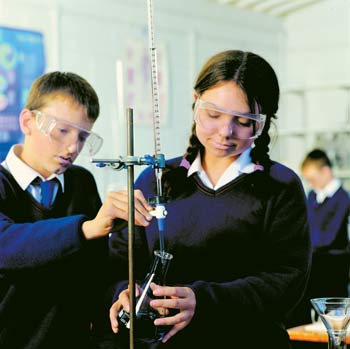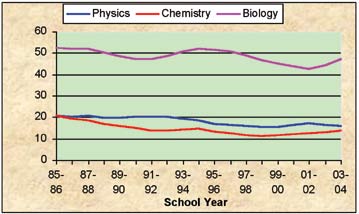| 2004 |

|
YEAR BOOK |
Department of Education and Science
|
Science in our Schools
|

Science education, its importance
The importance of science is being increasingly emphasised as a critical factor for the development of a creative and competitive knowledge-based economy in Ireland. The 'Lisbon Strategy' outlines a similar vision for the EU and sees education systems playing a key role in making this a reality.
Science, an important component of school curricula
The revised primary curriculum has an increased emphasis on science, and provides a foundation which can be developed through the revised Junior Certificate Science syllabus at second level. Though the introduction of the revised Junior Science syllabus in September 2003 was on an optional basis, approximately 90% of schools indicated their intention to provide the revised syllabus to their students in the 2003/2004 school year. All schools were expected to implement the revised syllabus from September 2004 with the exception of a small number which sought a derogation on the basis of having inadequate laboratory facilities. The intention is that all schools will be in a position to implement the revised syllabus by September 2005.
At Leaving Certificate level, Physics, Chemistry and Biology syllabi have all been revised since 2000: these revised syllabi have an increased emphasis on student practical work and on the interface between science, technology and society. The revised syllabi promote the development of students' manipulative, cognitive, observational and logic skills. Revisions of the Agricultural Science and Physics and Chemistry (combined) syllabi by the National Council for Curriculum and Assessment (NCCA) are at an advanced stage.
The Transition Year Programme provides an opportunity for students to broaden their experience of science, and a strong emphasis on science in Transition Year can contribute to increased engagement at Leaving Certificate level. As the Transition Year Programme has developed, collaboration between education and industry has increased, and this has resulted in the production in many schools of interesting and innovative science modules for students.

Science, a need for up-skilling and resourcing
The Department has provided comprehensive in-career development programmes for all primary teachers and for 1000 chemistry teachers, 900 physics teachers, 1700 biology teachers, and almost 3000 teachers of Junior Science at second level. Through these programmes, teachers are supported in putting into practice changes in syllabus content, assessment, teaching methodologies and the use of various ICT technologies; the programmes also help to foster the development of a network culture between teachers. Though the Leaving Certificate programmes are completed, the Junior Science Support Service, based in Sligo Education Centre, carries on the work of providing continuing professional development to science teachers nationally. Information on this programme and access to the materials produced is available on the programme website, www.juniorscience.ie.
Physical resources are also being made available to support the introduction of revised programmes. Additional grants have been provided for the physical sciences at Leaving Certificate level while, at Junior cycle, schools providing the revised Science syllabus can apply for grants of �3,500 per junior science laboratory, and those with additional needs are also invited to apply for an enhanced grant. It is estimated that, on average, schools receive a total of over �18,000 each under this scheme. At primary level, twelve regionally-based Cuiditheoir� are providing continuing support to teachers in science. Physical resources required for the implementation of new teaching programmes at this level are also being made available.
Science, a need for collaboration
Collaboration between scientists, engineers, industry, third level institutions, etc., and schools is contributing to the enrichment of science education in Ireland. Discover Science & Engineering (www.science.ie) is the new National Integrated Awareness Programme, and it brings together many existing science, engineering, technology and innovation awareness activities. Science Foundation Ireland, through its 'STAR' programme, provides teachers with unique and exciting opportunities to work at the cutting edge of research and to acquire new skills and knowledge which can be passed on to their students.
Science, a need for increased participation
Given the importance of science, not only for the economic well-being of the country but also for the personal development of the individual citizen, participation rates in science at senior cycle level have been a cause of concern for some time. Although the uptake of science at junior cycle has been consistently high at close to 90% of the cohort, participation rates in the physical sciences at senior cycle declined steadily from the mid-1980s: more recently, there has also been a decline in the uptake of biology. However, as the various initiatives outlined above have been implemented over the past few years, participation rates in the main science subjects have increased somewhat (see chart � data for 2003�04 are provisional). Participation rates in the physical sciences are still low and continued efforts by all the agencies involved, both individually and co-operatively, will be required to ensure that adequate numbers of young people are attracted to study and work in science-related fields.
Contact: Dr Carl � D�laigh, Deputy Chief Inspector, Department of Education and Science, Marlborough Street, Dublin 1.